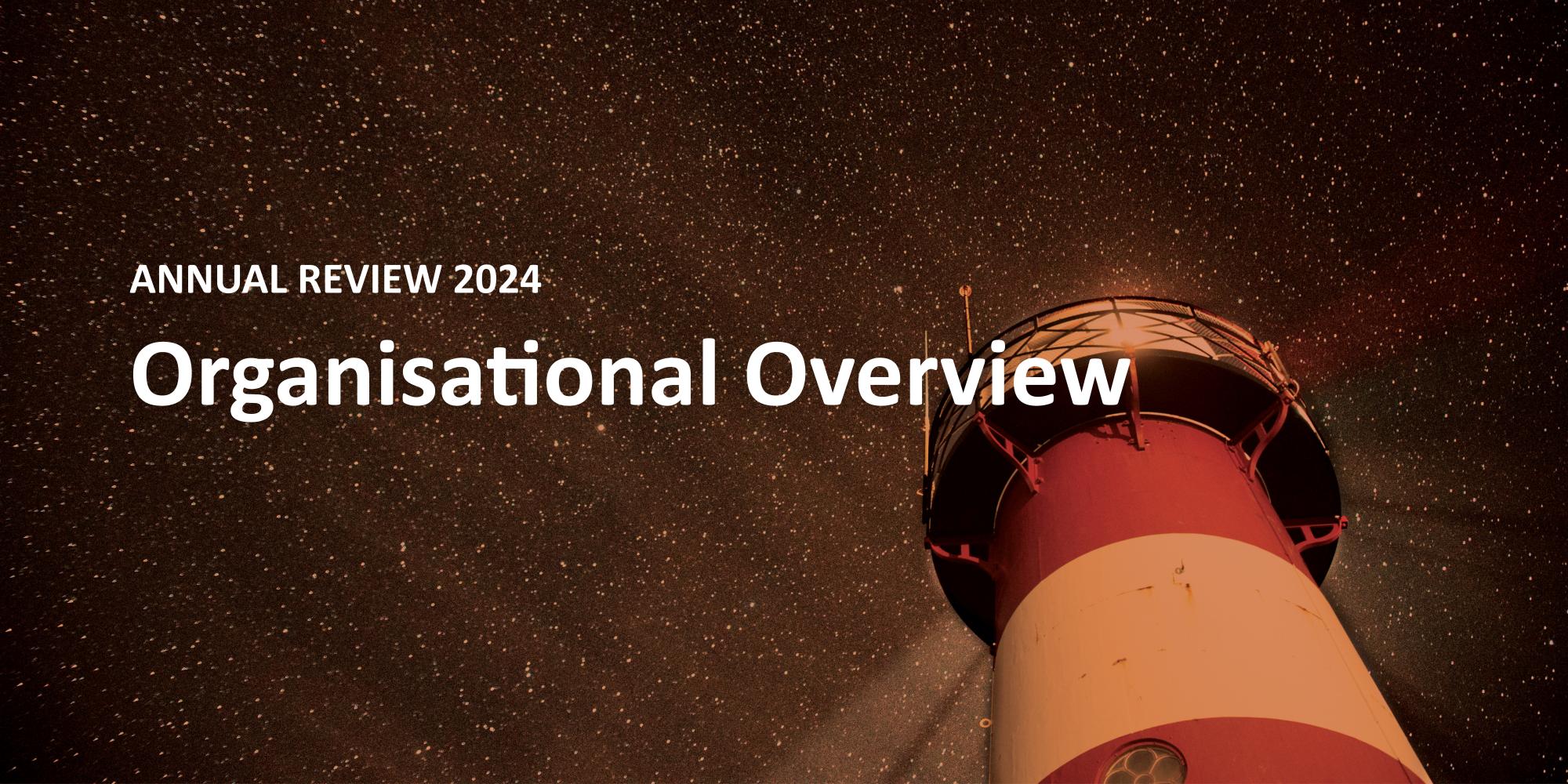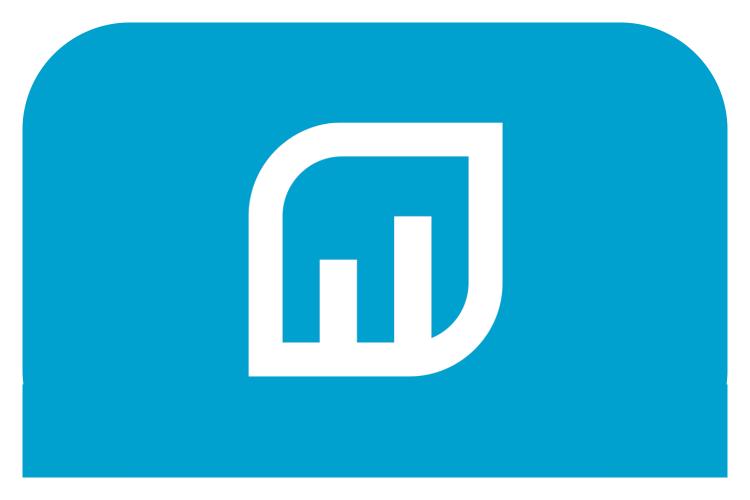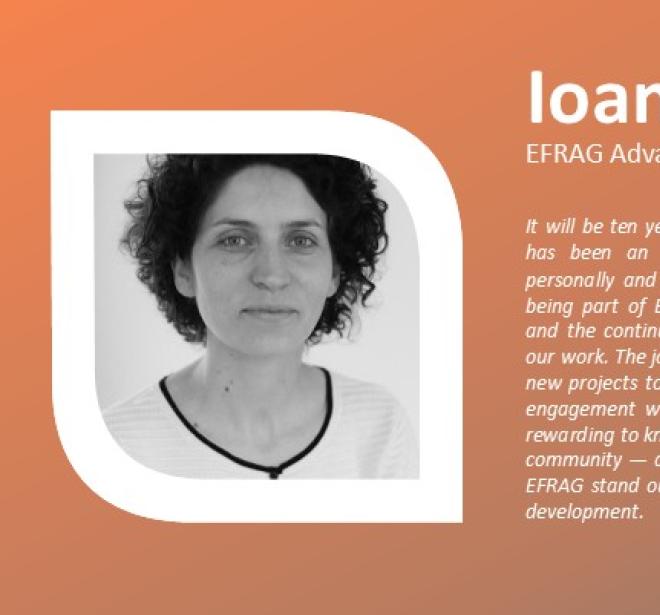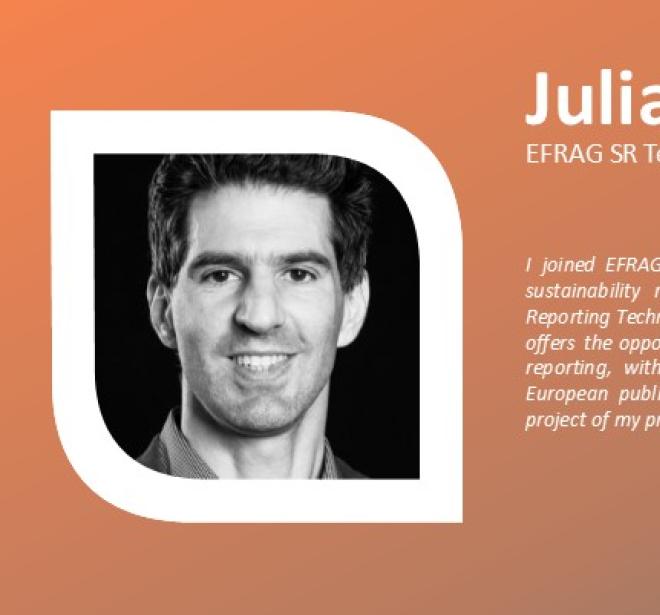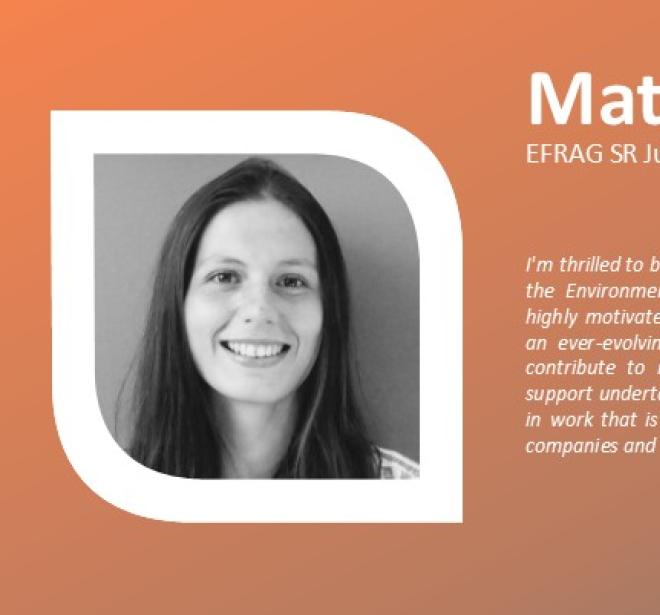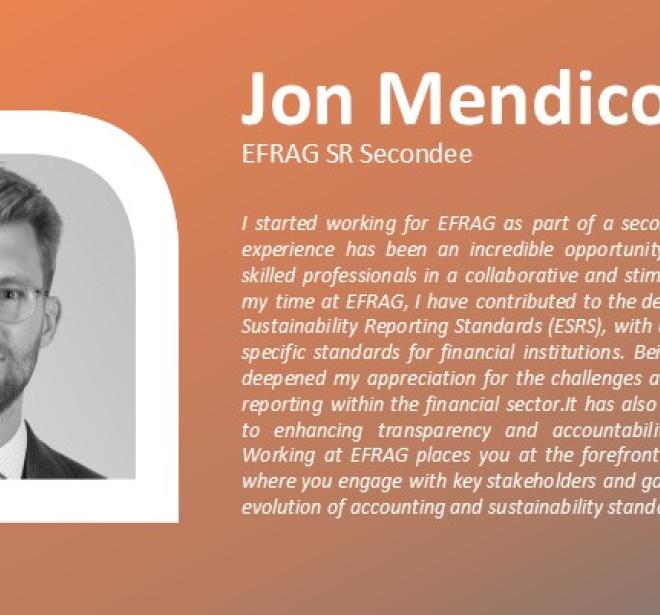About EFRAG
Increasing Competitiveness and Transparency in Challenging Times
By Benoit Jaspar, EFRAG Administrative Board President
In 2024, EFRAG’s Administrative Board embarked on a new phase with its new constitution in January. The new Administrative Board has reinforced our commitment to strong governance and the effective management of EFRAG’s two pillars: financial reporting and sustainability reporting.

It is important to emphasise that while sustainability reporting has gained prominence, financial reporting remains at the core of EFRAG’s expertise, being the foundation upon which we have built our reputation and credibility.
I would like to take this opportunity to express my gratitude to my predecessor, Hans Buysse, for his unwavering commitment to EFRAG. His leadership has been instrumental in facilitating a smooth transition and ensuring continuity in our strategic direction.
Sadly, 2024 also brought the loss of a dear friend and esteemed colleague Anders Ullberg, who passed away in September. Anders was a highly respected member of the Administrative Board, Chair of its Remuneration Committee and a distinguished representative of the Swedish standard setter. His vast managerial experience and dedication to EFRAG have left an enduring mark on our organisation. He will be deeply missed.
Key Priorities
EFRAG has continued to grow substantially in terms of its staff to meet its expanding mission. This growth ensures that we have the necessary expertise and capacity to address the increasing complexity of our work. The Administrative Board has played a crucial role in steering this expansion and ensuring that EFRAG’s governance and operational structures remain robust and fit for purpose.
As President of the Administrative Board, my priority is securing sufficient long-term funding for EFRAG's current structure while safeguarding its independence. EFRAG funding remains suboptimal, a point that both my predecessors and I have emphasised for several years. This insufficient funding puts the entire organisation under pressure and is a major problem that will have to be resolved sooner or later to ensure EFRAG’s long-term stability and success. I will continue working to increase EU funding, to further develop Friends of EFRAG, and to explore event sponsorships and other funding opportunities. Simultaneously, I will aim to ensure the efficient use of existing resources. We made positive strides in 2024 with EFRAG’s successful application for the Action Grant for the ‘Embarking companies and stakeholders into the European sustainability reporting journey’ pilot project. We have also seen an increase in both the number of Friends of EFRAG and related funding, demonstrating growing interest and engagement in our work.
In addition, we have carried out projects in partnership with national standard setters in Europe to ensure resources are used efficiently and to promote stronger coordination at the European level. Much more can still be done in the future.
The success of our annual conference on 10 December, titled ‘Advancing Transparency & Competitiveness in Challenging Times’ was a significant milestone. With 300 participants attending in person and approximately 1.300 joining online, the event underscored EFRAG’s pivotal role in fostering dialogue and thought leadership in financial and sustainability reporting.
Acknowledgments
As we look ahead, I want to extend my heartfelt appreciation to all those who contribute to EFRAG’s success – our Member Organisations, General Assembly, Boards, TEGs, working groups, advisory panels and dedicated staff. Your commitment and hard work are invaluable in advancing EFRAG’s mission and strengthening its impact in Europe and beyond.
Together, we will continue to build on EFRAG’s legacy and ensure that it remains a key player in financial and sustainability reporting, upholding the highest standards of transparency, accountability and technical excellence.
I would like already at this stage express our great thanks to Patrick de Cambourg who announced in March 2025 that he is not available for a second term as EFRAG SRB Chair, his current term expiring mid November. Patrick has been the driving force and made an invaluable contribution to the EFRAG sustainability reporting work.
Maria Luis Albuquerque
EU Commissioner for Financial Services and the Savings and Investment Union

EFRAG has carried out outstanding work in 2024. Financial reporting is pivotal for efficient and well-functioning capital markets. Transparency is essential for maintaining trust and, therefore, a necessary condition for financial stability.
As the technical advisor to the Commission on IFRS Accounting Standards, EFRAG delivered endorsement advice on the amendments to Power Purchase Agreements in record time, and the Commission is now in the process of endorsing these amendments. Additionally, in 2024, the International Accounting Standards Board issued two new standards – IFRS 18 and IFRS 19 – and the Commission expects to soon receive endorsement advice from EFRAG on these standards.
In addition to its work on financial reporting, EFRAG has worked extremely hard on developing and implementing the EU’s sustainability reporting framework, often amid challenging circumstances.
In 2024, EFRAG worked to provide guidance and interpretation on the application of the first set of European Sustainability Reporting Standards (ESRS) to ensure consistency and reduce complexity. EFRAG also developed reporting standards for SMEs, which will help smaller companies better meet increasing demands for sustainability information and grasp the opportunities of the transition to a sustainable economy. A high level of interoperability with global sustainability reporting standards remains an important strategic goal, and in May 2024, EFRAG published joint interoperability guidance with the ISSB. As a result, European companies reporting according to the ESRS should also find it easier to meet global reporting standards.
All of EFRAG’s achievements – whether in financial reporting, sustainability reporting or, increasingly, at the intersection of both – are the result of much hard work by all members of the EFRAG community.
EFRAG is a trusted authority on both financial reporting and sustainability reporting. EFRAG plays a key role in advancing Europe’s goals in these important fields.
Erkki Liikanen
Chair of the IFRS Foundation Trustees

Since 2001, the IFRS Foundation and EFRAG have been close partners, enhancing transparency and efficiency in capital markets through collaborating on the development and adoption of global reporting standards. Our partnership empowers investors with the information needed for informed decision-making.
Over the past year, our cooperation has achieved interoperability in our respective sustainability disclosure requirements. It has supported the EU endorsement of new accounting standards that will improve the quality of information for investors and ease the reporting burden for companies.
We remain committed to building on our shared successes, continuing to work effectively together to shape corporate reporting.
Key Achievements in 2024
In 2024, EFRAG made significant progress in both financial and sustainability reporting activities.
In financial reporting, EFRAG actively advised the European Commission (EC) and provided comments to the IASB on various standards, including IAS 21 The Effects of Changes in Foreign Exchange Rates: Lack of Exchangeability, IFRS 16 Leases, and IFRS 19 Subsidiaries without Public Accountability, issuing comment letters and educational materials. A key development was the publication of the exposure draft on the Due Process Procedures for Financial Reporting for public consultation, formalising EFRAG’s comprehensive due process applied in financial reporting.
In sustainability reporting, EFRAG focused on the implementation of the ESRS, releasing technical explanations, implementation guidance, and the draft XBRL taxonomy for the first set of ESRS. It also launched exposure drafts for the ESRS for listed SMEs (LSME) and a voluntary standard for non-listed SMEs (VSME), actively engaging in outreach and consultations. EFRAG collaborated with the IFRS Foundation and the TNFD on interoperability guidance. By year-end, it had released 157 technical explanations on the ESRS and the technical advice to the European Commission for the VSME Standard. Lastly, Benoit Jaspar was appointed as the new President of the EFRAG Administrative Board, succeeding Hans Buysse.
EFRAG advised the European Commission on the IASB's amendments to IAS 21 The Effects of Changes in Foreign Exchange Rates: Lack of Exchangeability concerning lack of exchangeability and contributed to discussions on financial instruments with equity characteristics.
In the area of sustainability reporting, EFRAG published exposure drafts for the ESRS Standards for listed SMEs (ESRS LSME ED) and a voluntary standard for non-listed SMEs (VSME ED). Additionally, EFRAG announced the new composition of its Administrative Board.
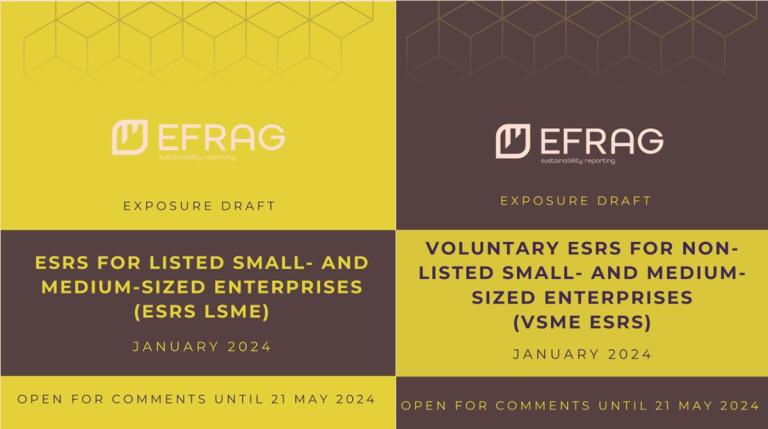
EFRAG supported the implementation of the ESRS by publishing technical explanations and announcing public consultations on draft XBRL taxonomies for ESRS Set 1. It actively organised outreach events and webinars to educate companies on the application of the European Sustainability Reporting Standards (ESRS), including SME standards and the XBRL taxonomy.
In the area of financial reporting, EFRAG launched a survey for the Post-Implementation Review of IFRS 16 and continued its outreach on Financial Instruments with Characteristics of Equity (FICE).

EFRAG continued its efforts to support the implementation of the ESRS by publishing the second set of technical explanations in response to questions received.
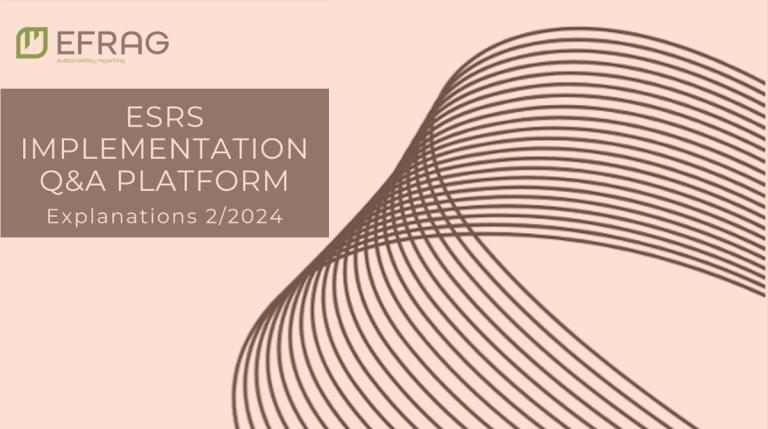
EFRAG published its final comment letter on the IASB’s consultation on Financial Instruments with Characteristics of Equity (FICE), thereby closing the consultation cycle for this project. EFRAG also issued a draft comment letter on the IASB’s proposed amendments relating to business combinations, goodwill, and impairment.
In the area of sustainability, EFRAG continued to launch initiatives aimed at educating companies on the practical application of the ESRS framework, including a Q&A session on the ESRS XBRL Taxonomy and outreach events on the ESRS VSME and LSME Exposure Drafts.

EFRAG supported the implementation of the ESRS by issuing three non-authoritative implementation guidance documents on materiality assessment, the value chain, and ESRS data points, and by releasing a third set of technical explanations.
The IFRS Foundation and EFRAG jointly published interoperability guidance to highlight the alignment between the ISSB Standards and the ESRS, aiming to reduce complexity for companies applying both frameworks. This was presented at a joint public event promoting the synergy between the two.
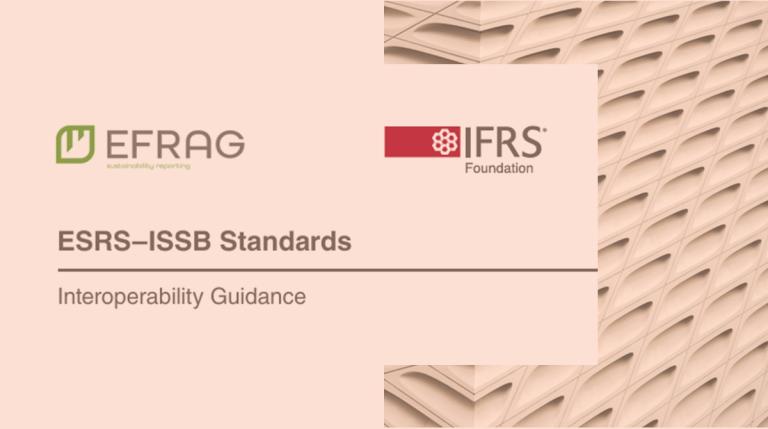
In the area of financial reporting, EFRAG focused on providing educational materials, including EFRAG and IASB educational sessions on IFRS 18 Presentation and Disclosure in Financial Statements and updated EFRAG Secretariat briefings on IFRS 19 Subsidiaries without Public Accountability. EFRAG also issued its draft comment letter on power purchase agreements.
In the area of sustainability reporting, EFRAG and the TNFD jointly published a mapping of ESRS and TNFD disclosures. EFRAG also released a paper and video on the interplay between connectivity and annual report boundaries.
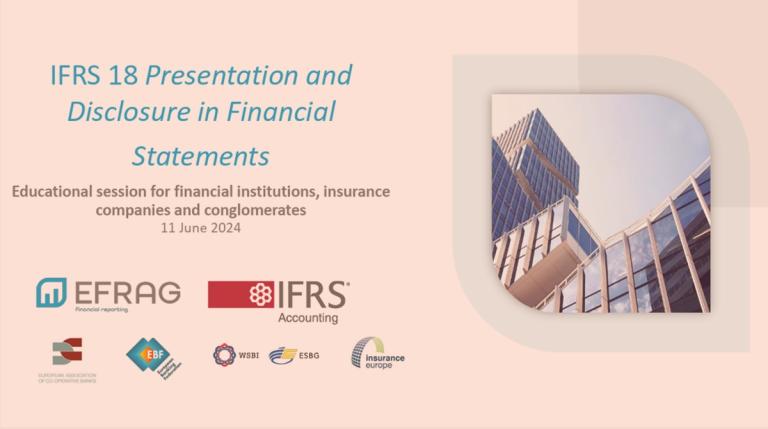
In the area of financial reporting, EFRAG issued its final comment letter on proposed amendments relating to business combinations, goodwill, and impairment, as well as on power purchase agreements.
In sustainability reporting, EFRAG released the Study on Early Implementation of ESRS: Insights from Selected EU Companies for Q2 2024. EFRAG also added new non-authoritative technical explanations to its compilation, intended to assist stakeholders with the implementation of the ESRS.
Finally, EFRAG launched its new website.

EFRAG submitted to the European Commission and published the draft XBRL Taxonomy for Set 1 ESRS. The taxonomy enables the digital tagging of information disclosed in accordance with the European Sustainability Reporting Standards.
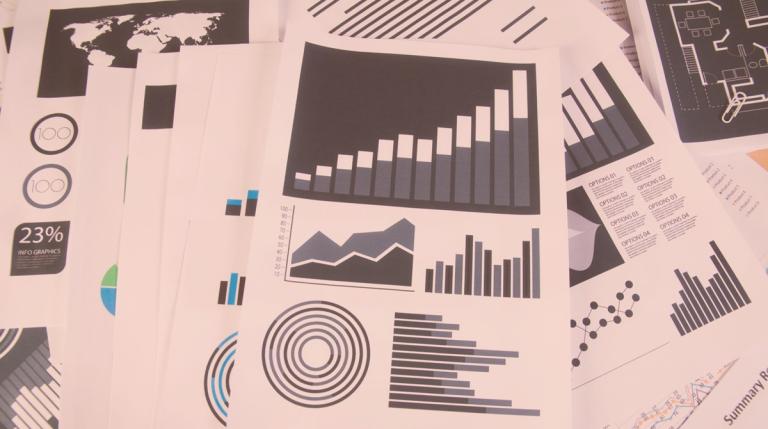
In the area of sustainability reporting, EFRAG intensified its engagement and educational sessions on the draft LSME standard.
In the area of financial reporting, EFRAG issued three draft comment letters on proposed amendments to IFRS 19 Subsidiaries without Public Accountability: Disclosures, on Climate-related and Other Uncertainties in the Financial Statements, and on Translation to a Hyperinflationary Presentation Currency. EFRAG also published an Exposure Draft on Due Process Procedures for Financial Reporting, with the aim of formalising the existing due process applied to its financial reporting activities.

In the area of financial reporting, EFRAG published its final endorsement advice on the amendments to IFRS 9 and IFRS 7: Classification and Measurement of Financial Instruments.

At COP29, EFRAG and CDP announced significant interoperability between CDP and the ESRS, streamlining environmental reporting.
It was an intensive month for the financial reporting pillar, with the publication of several documents, including draft and final comment letters on potential narrow-scope improvements to the equity method of accounting; on the IASB’s proposed amendments to IAS 21 The Effects of Changes in Foreign Exchange Rates: Lack of Exchangeability to address translation to a hyperinflationary presentation currency; on proposed amendments to IFRS 19 Subsidiaries without Public Accountability; on climate-related risks; and its draft endorsement advice to the European Commission on IFRS 18 Presentation and Disclosure in Financial Statements.
EFRAG also published a Discussion Paper on the perceived issues with the Statement of Cash Flows for public consultation.
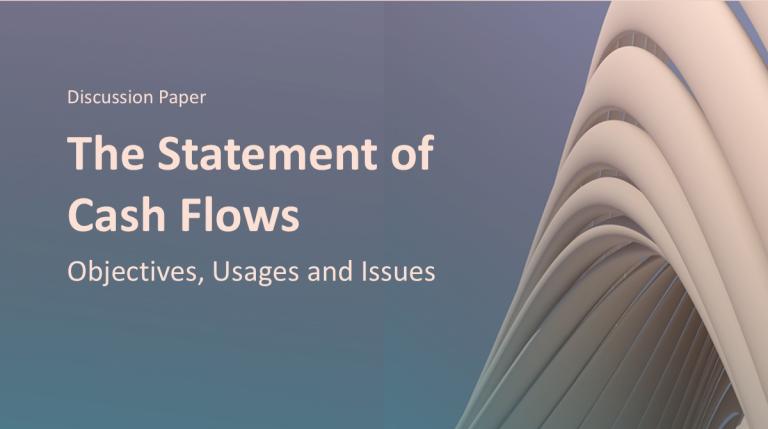
EFRAG submitted to the European Commission and published the Voluntary Sustainability Reporting Standard for non-listed SMEs (VSME). EFRAG also released an update to the Compilation of Explanations to respond to stakeholders' technical questions on the ESRS, which included a total of 157 explanations published between January and November 2024.
In financial reporting, EFRAG issued its Draft Endorsement Advice on Contracts Referencing Nature-dependent Electricity – Amendments to IFRS 9 and IFRS 7, and its draft comment letter on the IASB Exposure Draft (ED) on Provisions.
EFRAG held its annual conference "Advancing Transparency & Competitiveness in Challenging Times” on 10 December.
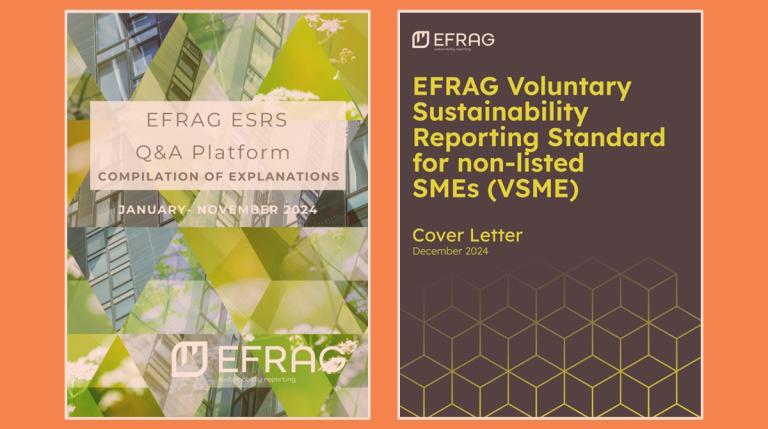
2024: A Year of Growth, Commitment, and Continuity
By Saskia Slomp, EFRAG CEO
Our staff are the heart of EFRAG. They are our most important asset, and their value cannot be underestimated. Without them, without their dedication, our corporate reporting standard-setting mission would not be possible. We count on our entire staff in the demanding, challenging and turbulent times to come in 2025 to meet important milestones in financial and sustainability reporting.
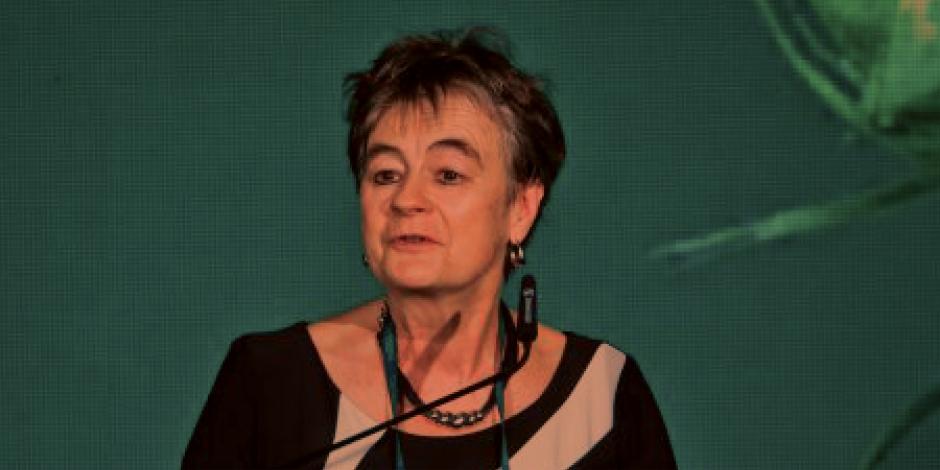
In 2024, we have seen tremendous changes in the world around us, with important impacts from the geopolitical environment in which we operate, bringing uncertainties and challenges for our work and mission of developing and influencing corporate reporting standards in Europe and globally. EFRAG remains committed as a technical advisor to the European Commission to deliver its advice both in the financial and sustainability reporting fields within tight deadlines. We are proud that EFRAG has grown into a key player in the sustainability reporting ecosystem while maintaining its core strength in influencing global financial reporting.
Governance Developments and Institutional Resilience
On the governance side, given the uncertainties we are facing, we have decided to postpone the Post-implementation Review of the Gauzes governance reform until there is more clarity on directions and future developments. With the challenging task faced in 2025 regarding the simplification of the ESRS, stability and continuity is of the essence.
In 2024, the EFRAG Administrative Board entered a new two-year term in January and saw the election of Benoit Jaspar as the new EFRAG Administrative Board President, succeeding Hans Buysse from 1 July 2024. We were glad to see that Hans Buysse continued as an EFRAG Administrative Board member for the user sector. Georg Lanfermann was confirmed in his role as EFRAG Administrative Board Vice President in September for the period until 30 June 2026. Sadly, we were informed of the passing of Anders Ullberg, the Swedish representative on the EFRAG Administrative Board. Peter Sampers, Chair of the EFRAG Administrative Board Due Process Committee, stepped down at the end of 2024 after having served in various roles at EFRAG almost since its establishment. We are very grateful for his contributions.
Following the completion of its first three-year term, the EFRAG FRB underwent a rotation, and we began the preparations for the EFRAG SRB rotation, aiming to appoint the EFRAG SRB in its new composition effective from 1 March 2025. In addition, there were the rotations of both EFRAG FR TEG and EFRAG SR TEG.
We appreciate very much the voluntary contributions of the members and observers in our governance bodies, who represent a wide array of stakeholders with an interest in corporate reporting
We are grateful to the European Parliament for providing additional funding for the sustainability reporting work through the pilot project ‘Embarking companies and stakeholders into the European sustainability reporting journey’, which aimed at involving a wider range of stakeholders and expertise in EFRAG ‘s activities, the development of a VSME Ecosystem; the development of an ESRS knowledge Hub and enhancing interoperability. This allows us to substantially enhance our sustainability reporting activities.
Strengthening Outreach and Accessibility with Our Revamped Website
A major milestone in 2024 was the launch of EFRAG’s new website. Our revamped site improves accessibility, stakeholder interaction and the transparency of our due process, enhancing our communication and outreach capabilities.
Investing in People to Meet New Challenges
Our staff more than doubled compared to the beginning of 2023, and by the end of 2024, it reached a stable number of approximately 70 employees (90 if interns are included), with about half working in the sustainability reporting pillar. They are fully committed to meeting deadlines and delivering high-quality work, sometimes unavoidably at the expense of their work-life balance.
It is very motivating to see their dedication, motivation and spirit. To foster team spirit, we have organised team-building events bringing the different staff together, with a particular focus on sports. In 2024, this included two padel events, corporate games where EFRAG teams composed of six players competed for the best scores over six weeks by committing to 30 minutes of movement per day, and participation in the 20 km of Brussels with other colleagues also joining as supporters to collect funds in 2024 for the KickCancer Foundation. We are now gearing up for the 2025 edition, which will support SOS Children’s Villages.
It is with deep sadness that we note the passing of our esteemed colleague Hocine Kebli in October 2024. Hocine dedicated over a decade to EFRAG in the financial reporting field and played a pivotal role in supporting the Gauzès governance reform, integrating the sustainability reporting pillar into EFRAG’s structure, and supporting the EFRAG Administrative Board Due Process Committee since its establishment. His contributions were invaluable, and he is greatly missed.
Shaping the Next Chapter Towards 2025
We will continue to deliver on our public interest mandate despite operating in an increasingly complex geopolitical and economic environment, in a global corporate reporting landscape that will continue to evolve. The resilience and commitment of our staff, the in-kind staff made available to us, and the volunteers in our governance bodies will be pivotal in navigating this landscape. The Omnibus proposals and the related specific mandate that EFRAG received on the simplification of ESRS will require the cooperation, motivation and commitment of all those involved at EFRAG, as well as of our stakeholders, to meet with good-quality deliverables the deadline set by the European Commission of 31 October 2025.
Internally, we have to decide whether we can stay in our current offices: that is, whether to move out or conduct a refurbishment exercise. We are transitioning to new time registration and bookkeeping and aim to report in 2025 under the VSME Standard.
We will work to further enhance engagement and visibility with our stakeholders and the public in general, building on the momentum created in recent years with the support of our new website. As we stand on the threshold of our 25th anniversary, we remain committed to excellence, transparency and collaboration in delivering on our mission.
Thank You to the Team and Partners
A big thanks to all our colleagues for their hard work, great contributions, dedication, motivation, good mood, sense of humour and smiles during 2024. We are confident that we are well prepared for the challenges ahead in 2025. Thanks to all the organisations providing secondments in kind, free of charge to EFRAG. A big thanks to all the members and observers in our Reporting Boards, Reporting TEGs, working groups and advisory panels for volunteering an impressive amount of time and providing their valuable contributions to our work. Together, we will contribute to shaping the future of corporate reporting in Europe and beyond.
The EFRAG Secretariat
The EFRAG Secretariat supports and coordinates all activities of EFRAG under the responsibility of the EFRAG Reporting TEG Chairs and EFRAG CEO. The EFRAG Secretariat consists of the EFRAG management team, technical managers, and support staff.
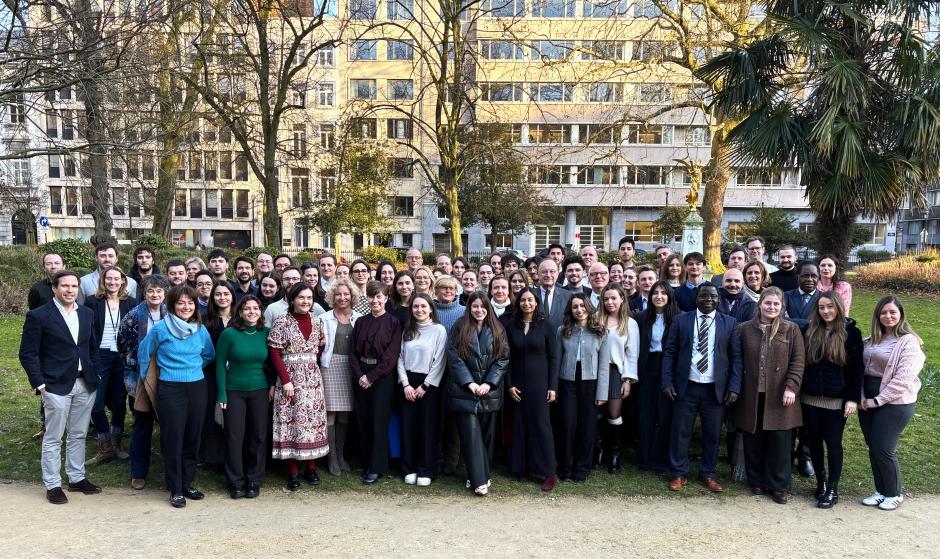
Current Composition of Our Governance Bodies, Working Groups, and Panels
Corporate
Pillar
Governance Bodies

Sustainability Reporting
Pillar
Working Groups & Panels

Financial Reporting
Pillar
Working Groups & Panels

EFRAG Administrative Board
The EFRAG Administrative Board in its new composition was appointed by the EFRAG General Assembly in December, effective from 22 January 2024. EFRAG welcomed Helmut Maukner as new EFRAG Adminstrative Board member for Austria, replacing Andrea Sternisko. EFRAG thanks Andrea Sternisko for her contributions to the EFRAG Administrative Board and to the EFRAG sustainability reporting activities.
In June, an election took place between the two candidates for EFRAG Administrative Board President, resulting in the appointment of Benoit Jaspar as the new EFRAG Administrative Board President, succeeding Hans Buysse, effective from 1 July 2024 for a term of two years. Hans Buysse continued as EFRAG Administrative Board member nominated by EFFAS.
In September 2024, Georg Lanfermann, representing the German standard setter GASC was reappointed as EFRAG Administrative Board Vice-President for the period till 30 June 2024.
In its September meeting, the EFRAG General Assembly extended the EFRAG Administrative Board with one additional seat for the Civil Society Organisations (CSO) Chapter so that the CSO Chapter would be represented by two members instead of one under the assumption that there would be at least five EFRAG Member Organisations in the CSO Chapter. In December, Matis Joab was appointed EFRAG Administrative Board member on the second seat representing the CSO Chapter.
In the last EFRAG General Assembly meeting of 2024, Harm van de Meerendonk was appointed as EFRAG Administrative Board member, replacing Peter Sampers, representing the Dutch standard setter DASB from 1 January. EFRAG thanks Peter Sampers for his contributions over so many years during the history of EFRAG in different capacities, in particular for the chairing of the newly formed EFRAG Administrative Board Due Process Committee in January 2022.
The EFRAG Administrative Board operates four committees:
Audit Budget and Risk Committee, chaired by Helmut Maukner.
Due Process Committee, chaired by Peter Sampers until 31 December 2024; in 2025, the chairmanship was taken over by Claes Norberg.
Nominating Committee (and extended with FRB and SRB members) chaired by Benoit Jaspar, EFRAG Administrative Board President.
Remuneration Committee, chaired by Anders Ullberg until his passing in September; Hans Buysse succeeded him in 2025 as Chair.
EFRAG Financial Reporting Board (EFRAG FRB)
The EFRAG FRB rotated in 2024 after being three years in existence. The EFRAG General Assembly appointed the EFRAG FRB in its new composition in April, effective from 1 May 2024. The EFRAG FRB welcomed as new members Anna Vidal, representing the banking sector, and Carlos Moreno, representing the Spanish Standard Setter ICAC. The other members were reappointed. EFRAG expresses its thanks to Rosa Bruguera (banking sector) and Maria Urrea (ICAC) for their contributions to the financial reporting activities. Jean Medernach (BETTER FINANCE) occupied the observership in the EFRAG FRB for European Organisations representing private investors.
In June, the EFRAG FRB welcomed Sylvie Koppes as FRB member nominated by Accountancy Europe, replacing Olivier Scherer. In September, the EFRAG General Assembly appointed Emmanuelle Gyomard, representing the French Standard Setter ANC, replacing Marie Seiller. EFRAG thanks Olivier Scherer and Marie Seiller for their contributions to the EFRAG FRB.
EFRAG Sustainability Reporting Board (EFRAG SRB)
In March 2024, the EFRAG SRB welcomed Thomas Roulland as the new representative for the asset management sector, replacing Tegwen Le Berthe.
In June, Maria Urrea, representing the Spanish standard setter ICAC, was appointed to replace Carlos Moreno, and Ruben Zandvliet, representing NGOs in the CSO Chapter, was appointed to replace David Vermijs.
In September 2024, Cristina Saporetti, nominated by BusinessEurope and representing the business general sector, was appointed to replace Stefan Schnell; Roderik Meeder, representing the banking sector, was appointed to replace Annina Tanhuanpää; and Mariyan Nikolov, representing the consumer organisations sector in the CSO Chapter, was appointed to replace Thierry Philipponnat.
EFRAG expresses its thanks to Tegwen Le Berthe, Carlos Moreno, David Vermijs, Stefan Schnell, Annina Tanhuanpää, and Thierry Philipponnat for their contributions to the EFRAG SRB and its sustainability reporting activities.
A call was issued to the EFRAG Member Organisations in the sustainability reporting pillar in the last quarter of 2024 for the rotation of the EFRAG SRB, as its initial three-year term is due to end on 28 February 2025.
EFRAG Financial Reporting Technical Expert Group (EFRAG FR TEG)
The EFRAG FR TEG rotation takes place every year, with approximately half of the members rotating off. Members who rotate off may be reappointed if they have not served the maximum term of six years. No changes took place during the year, other than Sylvie Koppes resigning from EFRAG FR TEG in July to join the EFRAG FRB.
EFRAG Sustainability Reporting Technical Expert Group (EFRAG SR TEG)
The entire EFRAG SR TEG rotated off at the end of April 2024. To establish a staggering of terms resulting in the annual rotation of approximately half of the members, half were (re)appointed for a one-year term. No changes took place during the year.
EFRAG's Financial
Overview
EFRAG’s Financial Statements
Abbreviated financial statements as of 31 December 2024
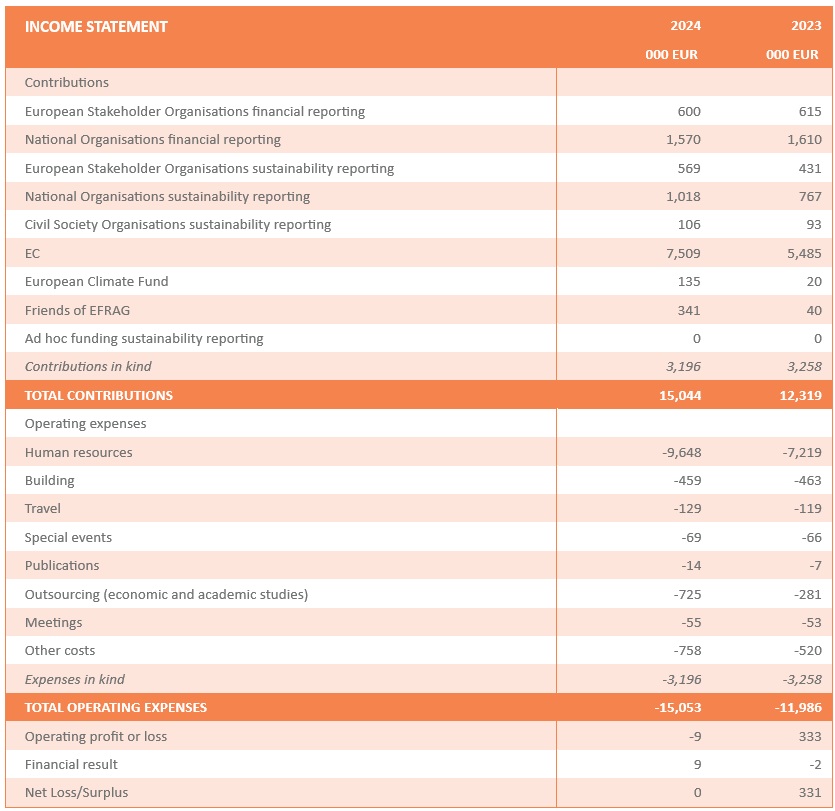
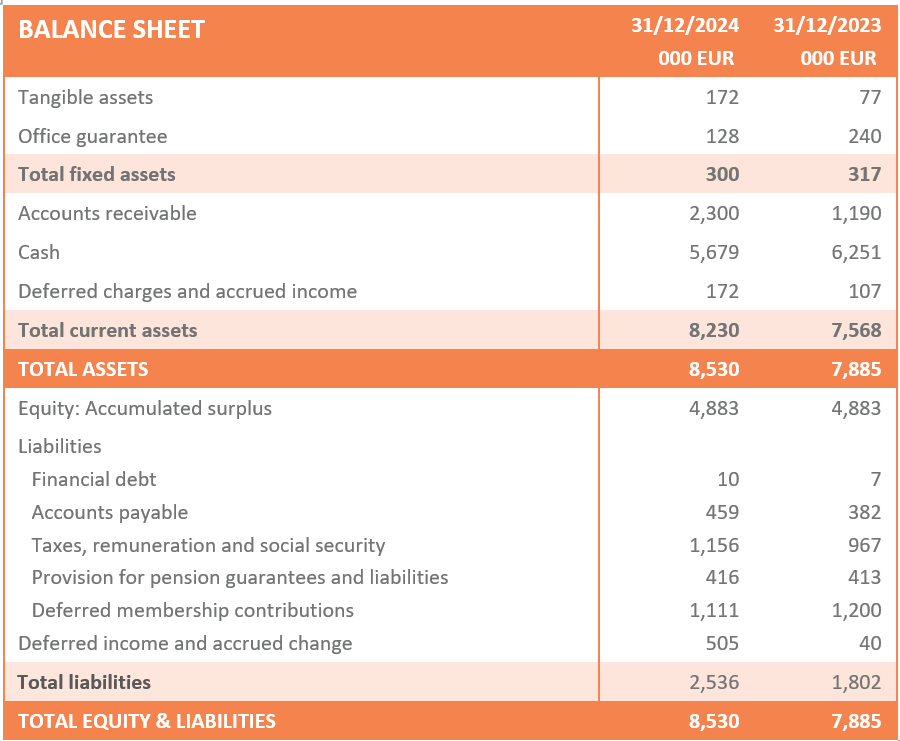
The financial highlights are based on statutory financial statements audited by BDO, Belgium, which issued an unqualified audit report on those statements on 7 March 2025. The statutory financial statements have been approved by the EFRAG General Assembly on 24 March 2025.
Contributions and expenses in kind
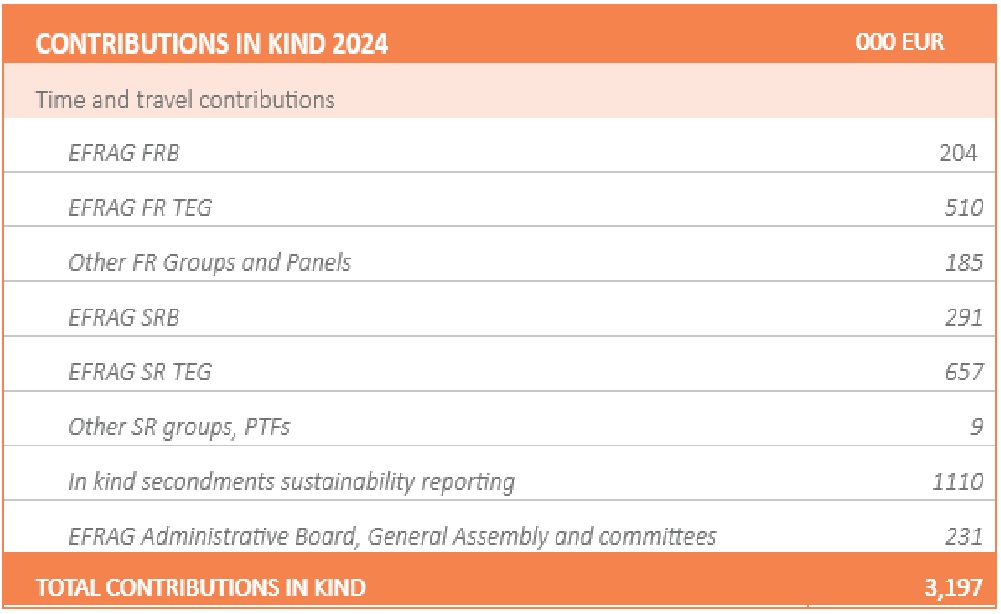
Financial Structure of EFRAG
EFRAG is a publicly and privately funded organisation working in the European public interest. The EC provides the public sector funding. At present, EFRAG’s structure comprises a Financial Reporting pillar and a Sustainability Reporting pillar. The EFRAG membership structure includes three chapters: the European Stakeholder Organisations Chapter, the National Organisations Chapter and the Civil Society Organisations Chapter. EFRAG Member Organisations can join one of the pillars or both. EFRAG has as of 31 December 31 Member Organisations.
Supported by the EC, the Council and the European Parliament, EFRAG is continuously seeking to broaden its membership base, notably in the National Organisations Chapter. EFRAG seeks as well to broaden is membership in the Civil Society Organisations Chapter and the European Stakeholder Organisations Chapter, notably with impact expertise organisations to be representative of as wide as possible a range of corporate reporting stakeholders.
In 2024 and in previous years, in addition to cash funding EFRAG received contributions in kind provided by the members of EFRAG Reporting TEGs, the EFRAG Reporting Boards, the EFRAG Administrative Board, the Committees, Working Groups, Advisory Panels and Project Task Forces as well as in the form of in-kind secondments.
The breakdown of contributions by Member Organisations is as follows.
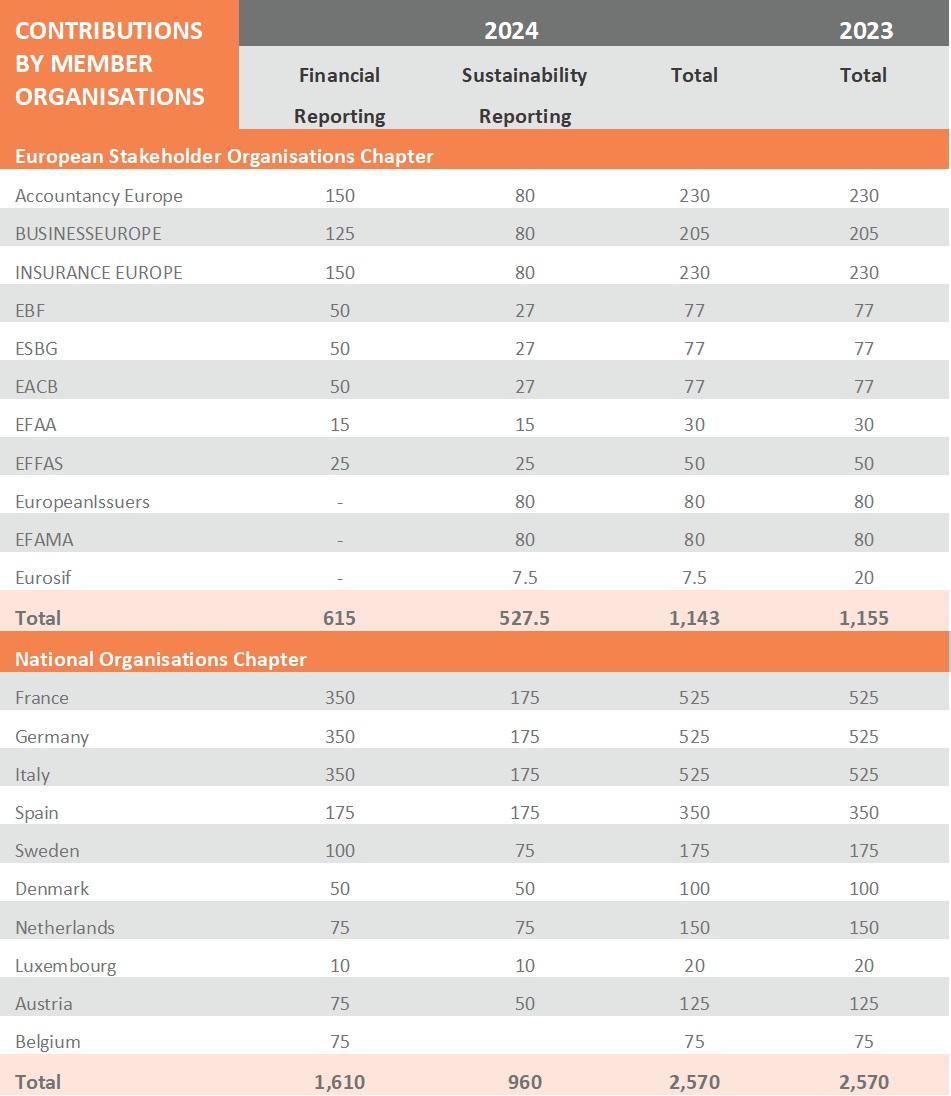
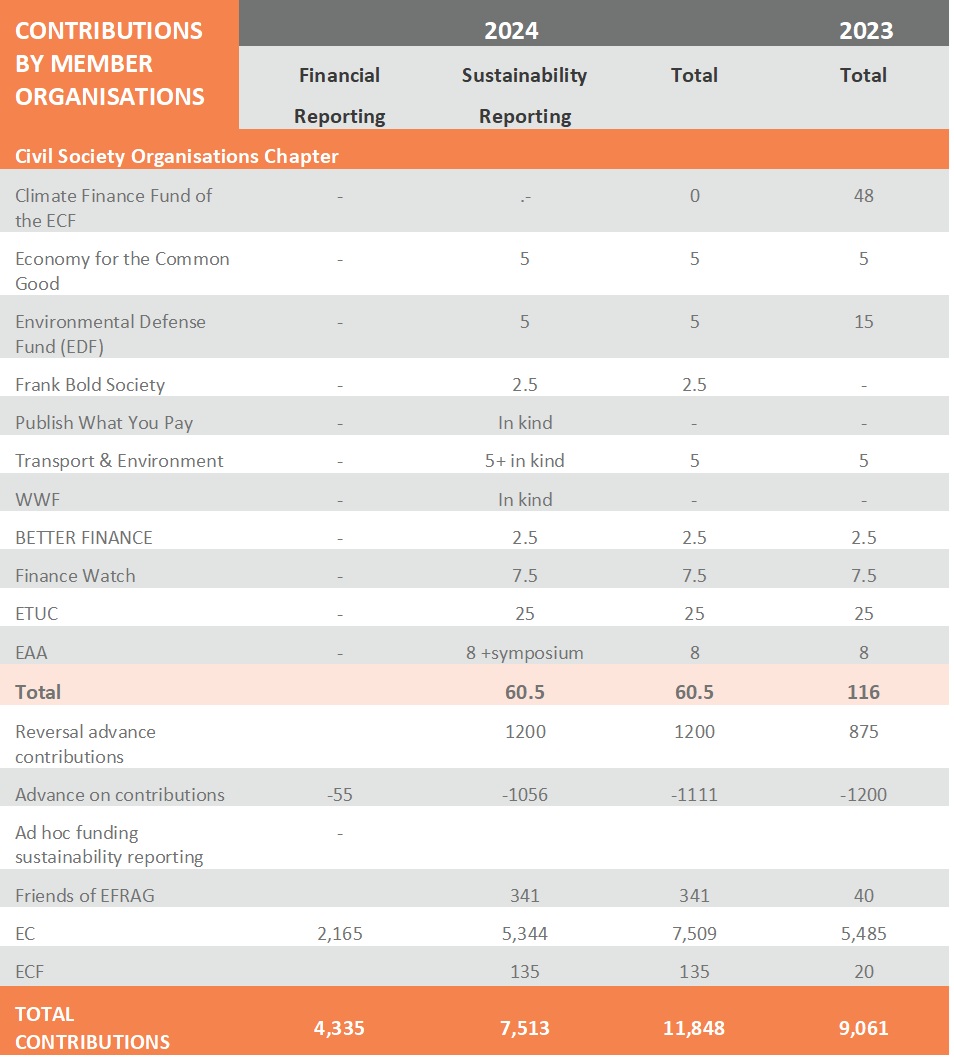
Contributing to EFRAG’s Work on Corporate Reporting
EFRAG welcomes stakeholders to actively engage and share their perspectives on corporate reporting. There are several ways to contribute to our work and support the development of high-quality reporting standards.
63 Organisations Became Friends of EFRAG in 2024
Since 2023, organisations interested in supporting EFRAG's mission and reporting activities can apply to become Friends of EFRAG for Sustainability Reporting and Financial Reporting.
63 companies took this step in 2024: Angela; World Business Council for Sustainable Development (WBCSD); Osapiens; Sibs; Greenomy; Global Sustainable Enterprise System; Karbonpath; CSRD Auditor; Baker Hughes; Code Gaia; Cleerit; Rose; Integrity Next; Watershed; SustainSoft; Atlas Metrics; Boston Consulting Group (BCG); Brightest; ClimateSeed; Ecobio; Ecocharting; Lucanet; Nordic Sustainability;Novata; Sunhat; Sweep; Position Green; Greenly; Novisto; Tenzing; CSRinfo; Sodali & Co; Envoria; South pole; XBRL; Boost technologies; CSRD Institute; Evolut; Generation Impact Global; Anthesis; Afore Consulting; Key ESG; Cubemos; Cometis; WAP Sustainability Consulting; futureplanet; EFFAS; Lufthansa Industry Solutions; Sosteniabilita; Amelkis; Verso; Zabka group; PlanA; Diaphane Software; 2030 Builder; Planted; Shuttle; DFGE; Responsible Business Forum Poland; Jupiter; Apiday; MHA; Convene ESG.
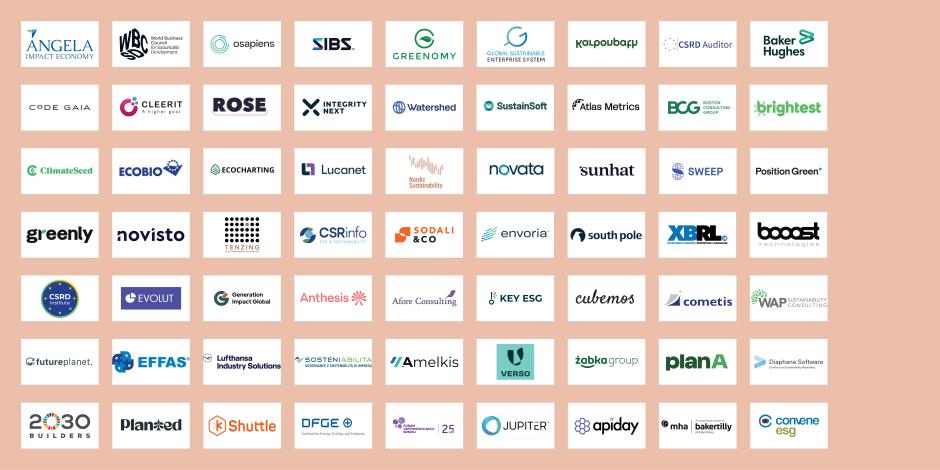
International Forum of Accounting Standards Setters (IFASS)
EFRAG’s influencing activities extend beyond the EU, including through its participation in the International Forum of Accounting Standard Setters (IFASS), a group consisting of national, regional and international accounting and sustainability reporting standard setters and other interested stakeholders.
The EFRAG SR TEG Chair, Chiara Del Prete, served as the IFASS Chair for a three-year term, from March 2022 to March 2025, with EFRAG providing the IFASS Secretariat support.
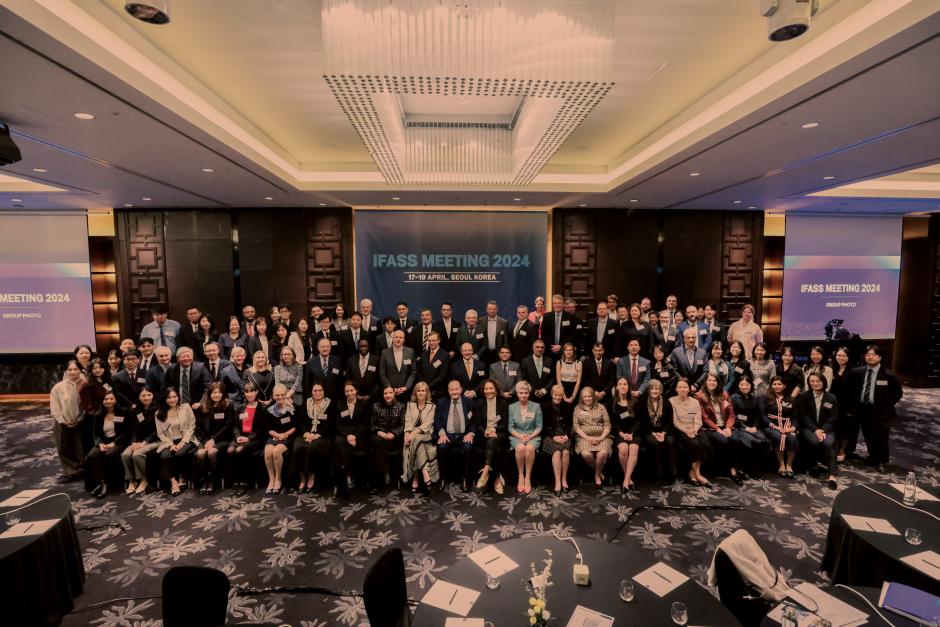
EFRAG representatives from both the financial reporting and sustainability reporting pillars also regularly present EFRAG at IFASS meetings, which gives visibility to EFRAG’s technical outputs, helps to influence the thinking of other national standard setters and positions EFRAG as a thought leader. EFRAG’s participation at IFASS also offers the opportunity to develop mutually beneficial relationships with other national standard setters, including through holding bilateral meetings to exchange views on topics of mutual interest.
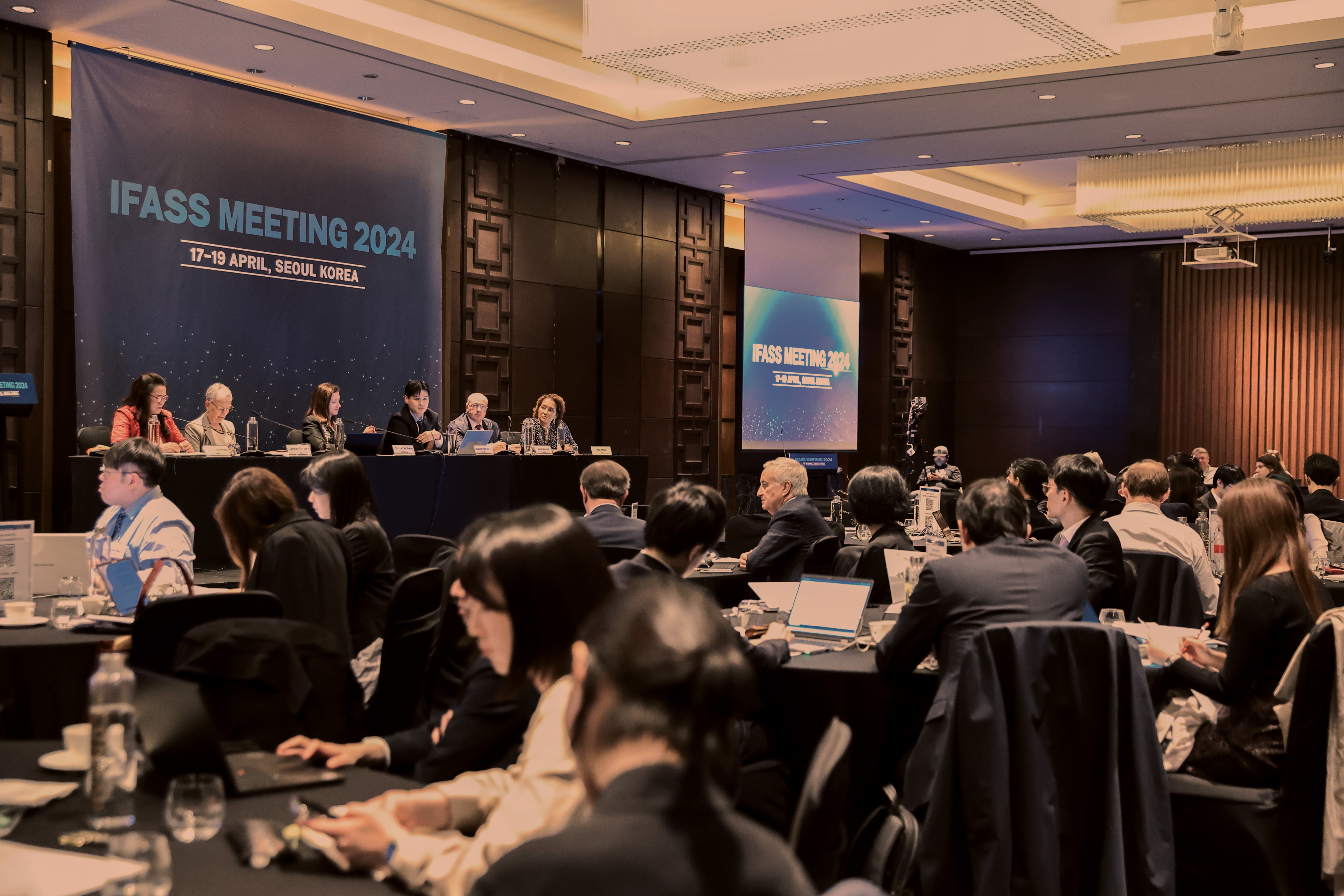
In 2024, under Chiara Del Prete’s leadership and with EFRAG providing the IFASS Secretariat with support, two hybrid IFASS meetings were respectively held in April in Seoul, hosted by the Korean Accounting Institute, and in September in London, hosted by the IFRS Foundation. EFRAG’s representatives presented at several of the sessions during these meetings and held bilateral meetings with representatives of the Australian, Canadian, New Zealand and Korean standard setters as well as the US SEC.
17 - 19 April 2024, IFASS meeting hosted by the Korean Accounting Institute (KAI) in Seoul, Korea
This hybrid meeting had 200-plus participants (attendees and/or speakers: 90-plus in-person and 110-plus virtual) from 34 jurisdictions and consisted of national and international standard setters, legislative authorities and representatives from various organisations.
There were 15 sessions covering financial and sustainability reporting topics, where participants could either select the financial reporting or the sustainability reporting stream.
Some of the topics discussed included: Rate-regulated activities; PIR IFRS 16 Leases - Jurisdictional perspectives; IFRS 19-Subsidiaries without Public Accountability; Financial Instruments with Characteristics of Equity; Sustainability Reporting Developments and IFRS Sustainability Disclosures Standards adoption; Application of materiality in SR; Guidelines to support Climate disclosures and transition plans; Financial and Sustainability reporting jurisdictional updates; Connectivity and Boundaries within Annual Report; Artificial Intelligence in Standard Setting.
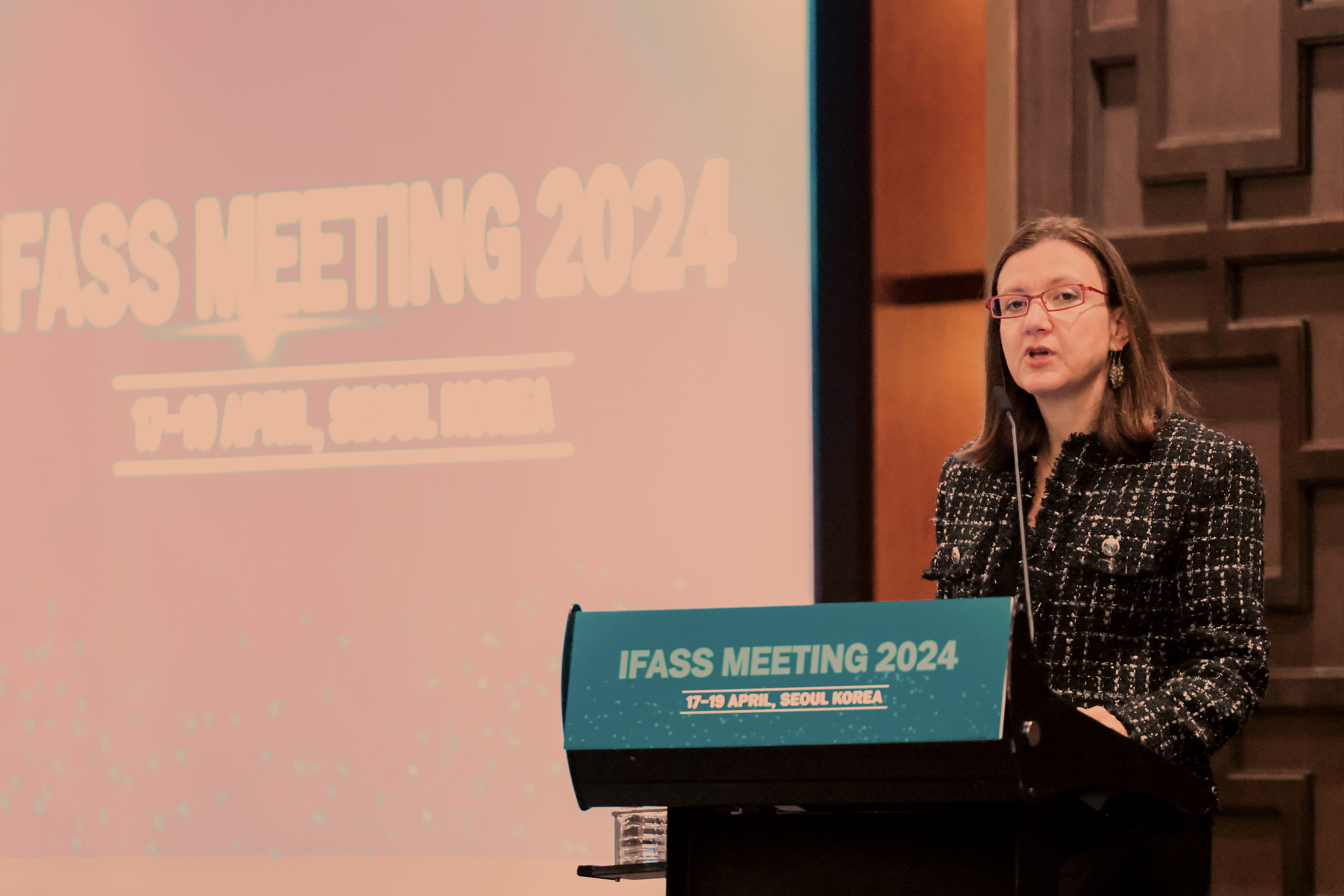
24 - 25 September, IFASS meeting hosted by the IFRS Foundation in London, UK
This hybrid meeting had 170-plus participants (attendees and/or speakers: 130-plus in-person and 40-plus virtual) from 36 jurisdictions. It consisted of national and international standard setters and legislative authorities.
There were 9 sessions covering financial and sustainability reporting.
Some of the topics discussed were as follows:
- Power Purchase Agreements
- Intangible assets
- Cash-flow reporting
- Financial and sustainability reporting jurisdictional updates
- Sustainability Reporting SMEs reporting
- Jurisdictional perspectives on climate-related standards
- Connectivity between Financial Reporting and Sustainability Reporting
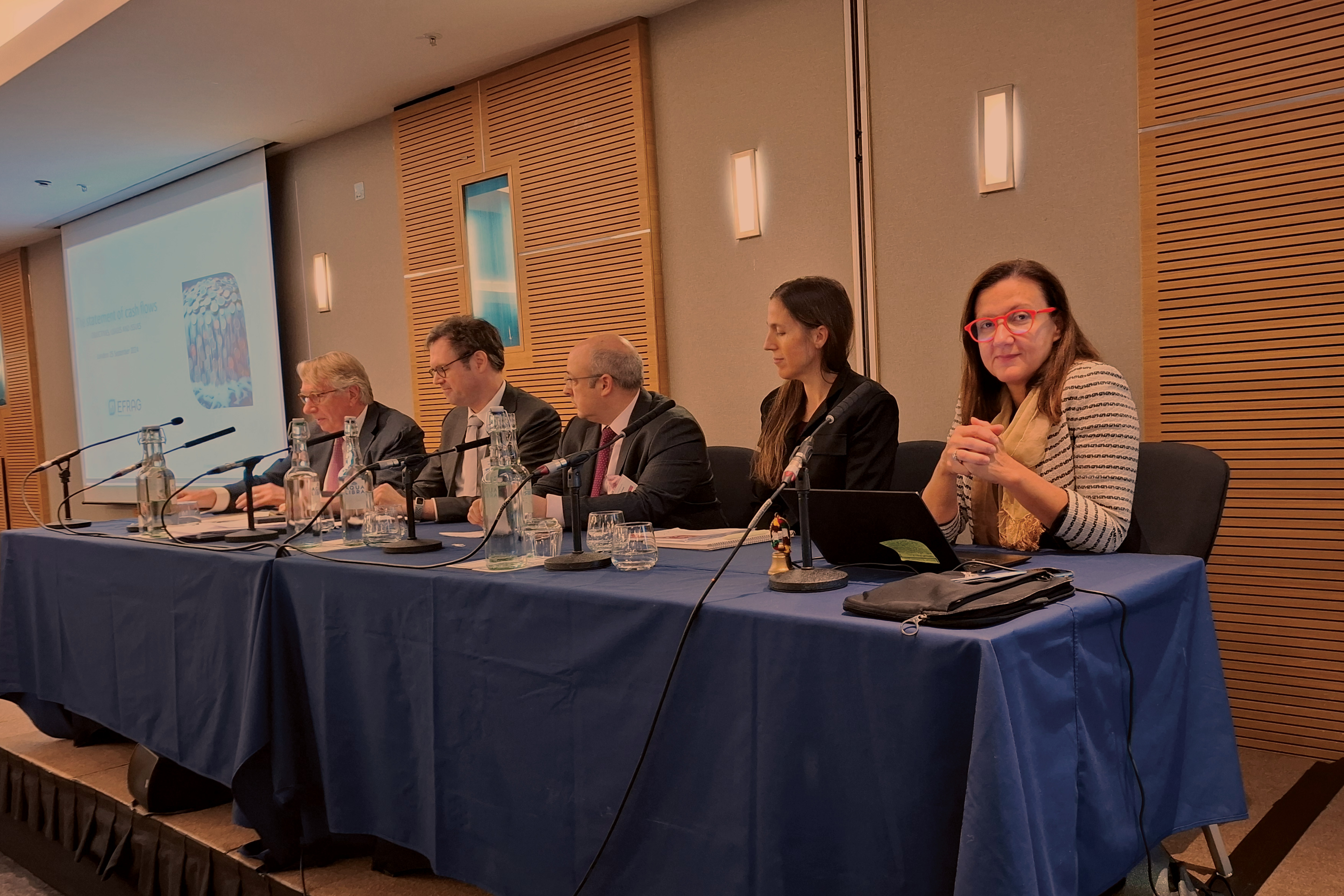
The EFRAG Annual Conference
"Advancing Transparency & Competitiveness in Challenging Times"
On 10 December 2024, EFRAG hosted its third annual conference – Advancing Transparency and Competitiveness in Challenging Times – in Brussels. The event highlighted EFRAG’s recent progress in sustainability reporting alongside emerging developments in financial reporting. High-level speakers and panellists addressed the shifting corporate reporting landscape for an audience of about 350 in-person participants and 500 online attendees, many of whom shared their insights on sustainability reporting, corporate reporting, and financial reporting. Discussions spanned topics from adapting IFRS Accounting Standards to a rapidly changing world to providing guidance for implementing the ESRS.
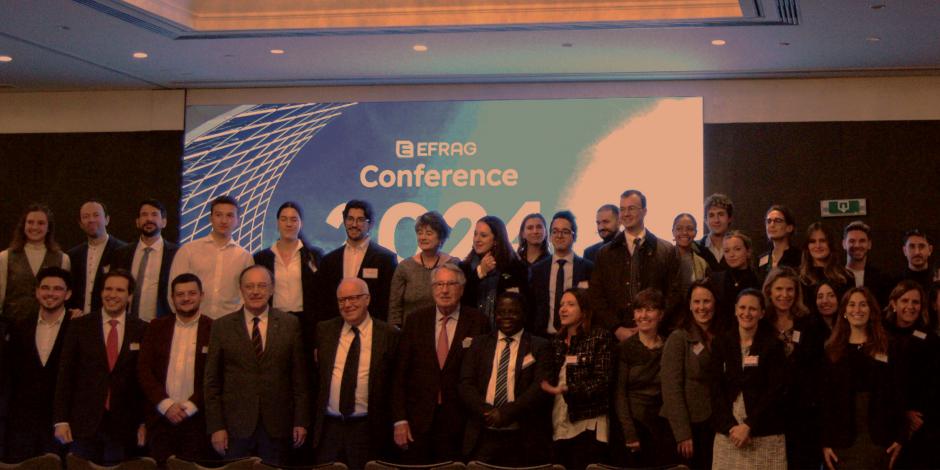

In his opening remarks, EFRAG Administrative Board President Benoit Jaspar underscored the organisation’s two-pillar structure— Financial Reporting and Sustainability Reporting—and its commitment to broad stakeholder engagement. Keynotes by representatives from the European Commission, including Director of DG FISMA Martin Merlin, praised EFRAG’s rapid growth and the significance of its role in shaping both financial and sustainability reporting. Merlin particularly encouraged companies to embrace the new EU standards with pragmatism, stressing the importance of digital tools and a balanced approach to avoid over-implementation. Altogether, these remarks set the tone for a forward-looking conference focused on transparency and global collaboration.
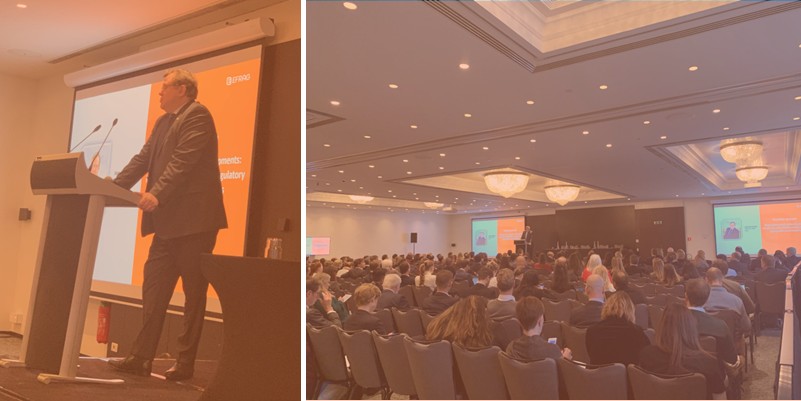
Additional keynote speakers highlighted the evolving regulatory landscape. IOSCO Chair Jean-Paul Servais called for proportionality in sustainability reporting and championed alignment efforts between ISSB and EFRAG standards. Meanwhile, EFRAG FRB Chair Wolf Klinz reflected on the growing interconnection of financial and sustainability reporting, emphasising EFRAG’s mission to balance European interests with global relevance. IASB Chair Andreas Barckow discussed how financial reporting has adapted to a changing world, stressing the continued importance of transparency and stakeholder trust in the global economy.
A series of panel discussions delved deeper into how these developments affect stakeholders of all sizes and regions. Panels explored the need for clearer sector-specific guidance, interoperability among various standards, and the significant role of AI and technological solutions. Speakers also underscored the essential interplay between impact reporting and financial data, calling for heightened user involvement and consensus-building. Notable exchanges highlighted the complexities of implementing the ESRS for non-EU companies, with participants from South Korea and the U.S. explaining how the ESRS framework can be both transformative and challenging to apply.

The conference continued with a focus on implementation: EFRAG Sustainability Reporting TEG Chair Chiara Del Prete outlined ongoing support activities, including the Voluntary Sustainability Reporting Standard (VSME) and the XBRL Taxonomy for Set 1. Panellists discussed how companies can turn mandatory reporting into strategic value, citing closer collaboration among finance, sustainability, and audit teams as key. They noted that consistent, structured data on sustainability fosters meaningful dialogue with investors, spurs operational efficiencies, and mitigates risks like greenwashing. Discussions also reinforced the importance of a measured approach: starting small, refining processes, and learning from the first reporting cycle.

In her keynote, Mary Schapiro (Vice Chair for Global Public Policy and Special Advisor to Michael R. Bloomberg) emphasised the urgent need for clear and credible climate-related disclosures to meet Europe’s ambitious decarbonisation goals. Calling transparency a cornerstone of competitiveness, she urged all stakeholders to harness robust data, sound transition plans, and aligned reporting standards. Conference Chair Benoit Jaspar then closed the event by acknowledging the speakers, panellists, and the EFRAG Secretariat for creating an insightful forum on how to advance corporate reporting in an era of rapid change.
Over 300.000 People Reached Between 2024 and Early 2025
On LinkedIn, followers nearly doubled, rising to +61,000.
On YouTube, with more than 100 comprehensive financial and sustainable reporting videos, EFRAG has drawn +387,000 views. Subscribers more than doubled, increasing to 3,080.
The EFRAG Newsletter grew significantly, nearly doubling its subscriber base to +45,700.
The EFRAG website has been visited on average by +230,000 active users.

